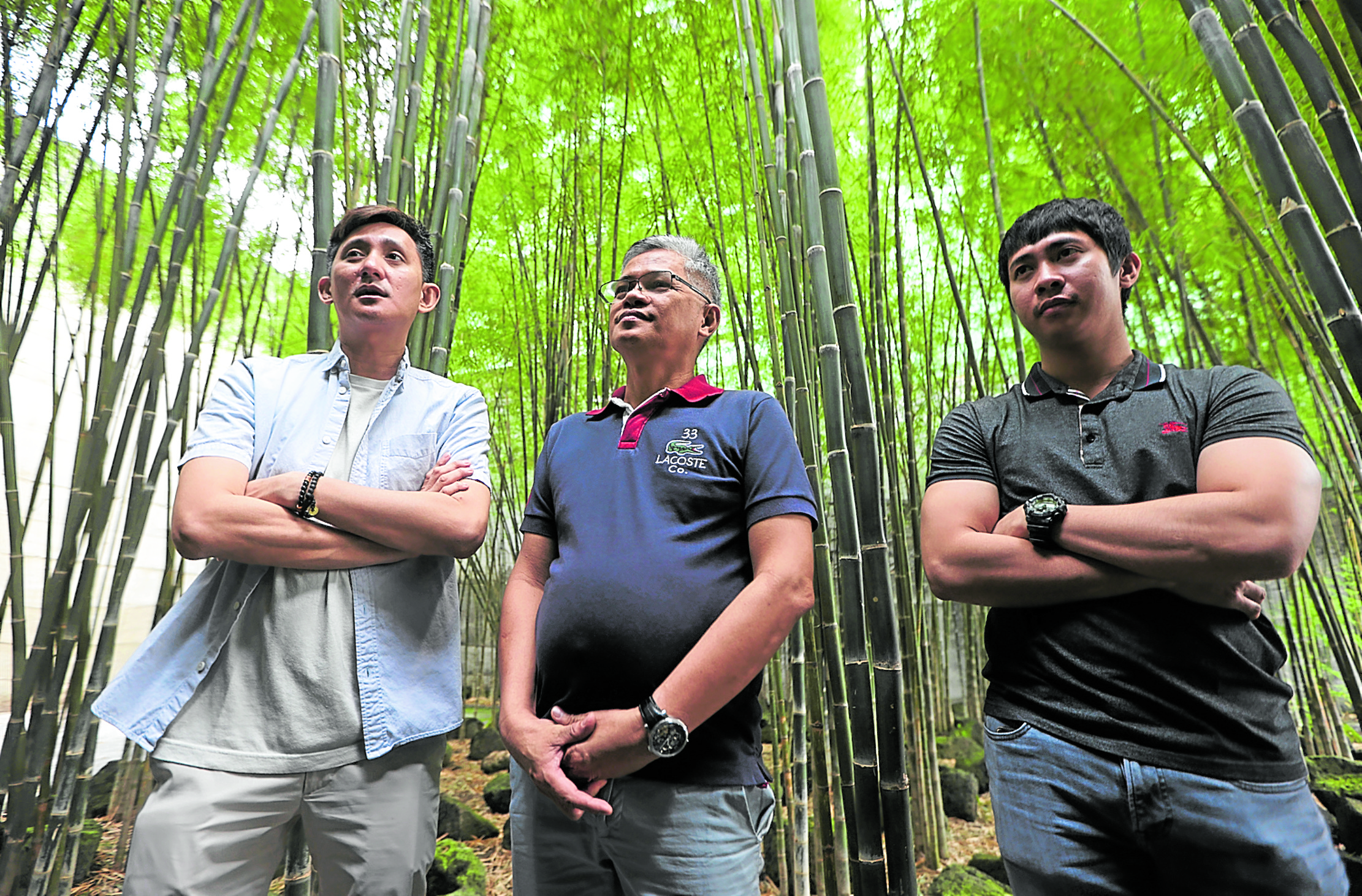
FREEDOM AT LAST Film director Jade Francis Castro (left) appears before the media in Quezon City on Tuesday after he and his three companions—Noel Mariano, Dominic Ramos and Ernesto Orcine—were released on Monday night when a Quezon court dismissed their case for destructive arson. Castro is shown here with Mariano and Ramos. —NIÑO JESUS ORBETA
“Traumatized” but in “good spirits” after regaining their freedom on Monday, movie director Jade Francis Castro and his three friends are now studying whether to file charges against the police officers who arrested them without a warrant last month on suspicion of being connected to an arson case in Catanauan town, Quezon province.
The four were ordered released after a court found that the group’s arrest in neighboring Mulanay town on Feb. 1 was “illegal,” based on an “absence of reasonable connections” between initial witness statements pointing to them as suspects in the burning of a minibus and a police report obtained through a dragnet operation.
“Jade et al are still thinking [about] whether they will sue the police,” lawyer Mike Marpuri, counsel for the four, told the Inquirer in a text message on Tuesday.
At a press conference in Quezon City, also on Tuesday, the lawyer said: “[We’re] still in the process of deciding because, after all, it’s their choice.”
Castro and his companions, civil engineers Noel Mariano and Dominic Ramos and sales manager Ernesto Orcine, were freed from the Bureau of Jail Management and Penology facility in Catanauan after Judge Julius Francis Galvez of Catanauan Regional Trial Court Branch 96 granted their motion to quash the charges.
Marpuri said the group received a copy of the court order around 4 p.m. on Monday.
‘We’re ordinary people’
The four were released from detention at 7:30 p.m. and immediately traveled back to Metro Manila.
In February, police alleged that the four men were identified by witnesses as members of an armed group that set a minibus on fire in Barangay Dahican on Jan. 31.
They were arrested the next day at a beach resort in Mulanay, despite closed-circuit television footage obtained by media outfits apparently showing their car passing a road at about the time the crime was taking place, as well as a separate video recording of Castro working at the Mulanay town plaza that same night.
The police, however, dismissed the footage, saying these might have been altered.
At the press conference in Quezon City, Castro, Mariano and Ramos appeared in public for the first time to speak about their ordeal, while Orcine was absent and opted to spend time with his family.
“We think the reason we were targeted was simply because we are ordinary people, not because I’m a director or they are engineers,” Castro said.
READ: 4 suspects in Quezon minibus burning freed from jail
“We happened to be there and they decided to point the finger at us, not because we were professionals or public figures, but because we were ordinary,” said the director of such films as “Endo” and “Zombadings.”
He said it would be “laughable” if the police had targeted him for his online activism, noting that he had only posted a few tweets critical of the government’s modernization program for public utility vehicles.
Administrative lapses
Marpuri said he received a call from the Philippine National Police’s Regional Internal Affairs Service that the erring police officers, as well as the town’s police chief, were now subjects of an investigation motu proprio (on its own initiative) for administrative lapses.
The PNP’s Internal Affairs Service has the power to launch investigations for cases involving human rights violations perpetrated by police officers, as well as operational lapses and breaches, corruption and other criminal activities.
But the PNP also said the arson case against Castro’s group was not yet dead.
The PNP spokesperson, Col. Jean Fajardo, maintained that the police officers’ actions to arrest Castro’s group were valid.
“Their motion to quash was granted, but it doesn’t address the entire case. It just means there wasn’t enough evidence from the PNP to justify the arrest of the group of Jade Castro. There was no trial on the merits of the case,” she told a press briefing.
Fajardo said the legal officers of the PNP in Calabarzon (Cavite, Laguna, Batangas, Rizal, Quezon) region were studying the possibility of filing a motion for reconsideration or an entirely new case.
Still a ‘strong case’
In a statement on Tuesday, Brig. Gen. Paul Kenneth Lucas, Calabarzon police director, insisted that the court “sustained the destructive arson case filed by the prosecution against them.”
“The ruling, in no way, undermines the dedication of the men and women of this regional office in building a strong case against the suspects. We will diligently gather appropriate evidence and work towards refiling the case of destructive arson against the accused,” he said.
Under the Rules of Court, a motion to quash is filed by an accused before arraignment. It challenges information or a charge sheet for defects apparent at face value.
Once granted, its effect will be a dismissal of the case.
After being illegally detained for 40 days, the four men are still reeling from the experience, Marpuri said at the press conference.
“They don’t want to return to Catanauan. They were somewhat traumatized by what happened to them,” he said.
Since their release, however, they “are in good spirits,” according to the lawyer.